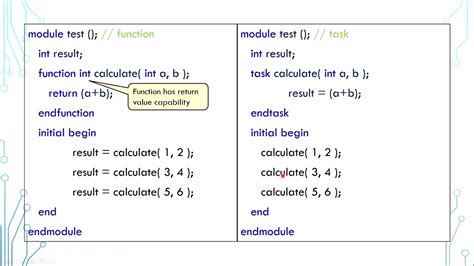In SystemVerilog, an enum is a user-defined type that represents a set of named values. Enums are useful for defining a set of named constants that have underlying numeric values. However, there are situations where you need to assign a value to an enum variable that is not one of the named values. This is where the $cast function comes in.
In this article, we will explore the $cast function in SystemVerilog and how it can be used to assign a value to an enum variable. We will also discuss the benefits and potential pitfalls of using $cast with enums.
What is the $cast function?
The $cast function is a SystemVerilog function that allows you to assign a value to a variable of a different type. It is a way to explicitly cast a value from one type to another. The $cast function takes two arguments: the value to be cast and the type to which the value should be cast.
Using $cast with enums
Enums are a type of strongly typed variable in SystemVerilog. When you declare an enum, you define a set of named values that have underlying numeric values. For example:
enum {RED, GREEN, BLUE} color;
In this example, RED has a value of 0, GREEN has a value of 1, and BLUE has a value of 2.
However, there may be situations where you need to assign a value to the color variable that is not one of the named values. For example:
color = 3; // Error: 3 is not a valid value for the enum
This will result in a compile-time error because 3 is not a valid value for the color enum.
To assign a value to the color variable that is not one of the named values, you can use the $cast function:
color = $cast(3);
This will assign the value 3 to the color variable, even though it is not one of the named values.
Benefits of using $cast with enums
Using $cast with enums provides several benefits:
- Flexibility:
$castallows you to assign values to enum variables that are not one of the named values. This can be useful in situations where you need to assign a value that is not one of the named values. - Explicit casting:
$castprovides an explicit way to cast a value from one type to another. This can make your code more readable and maintainable.
Potential pitfalls of using $cast with enums
While $cast provides flexibility and explicit casting, there are some potential pitfalls to be aware of:
- Loss of type safety: When you use
$castto assign a value to an enum variable, you are bypassing the type safety provided by the enum. This can lead to runtime errors if the assigned value is not a valid value for the enum. - Code readability: Using
$castcan make your code less readable, especially if the assigned value is not clearly related to the enum.
Best practices for using $cast with enums
To get the most out of using $cast with enums, follow these best practices:
- Use
$castsparingly: Only use$castwhen you need to assign a value to an enum variable that is not one of the named values. - Use explicit casting: Use
$castto provide explicit casting, rather than relying on implicit casting. - Document your code: Document your code to explain why you are using
$castand what the assigned value represents.

Conclusion
In conclusion, the $cast function provides a way to assign values to enum variables that are not one of the named values. While it provides flexibility and explicit casting, it should be used sparingly and with caution to avoid loss of type safety and code readability. By following best practices and documenting your code, you can get the most out of using $cast with enums in SystemVerilog.





FAQ
Q: What is the purpose of the $cast function in SystemVerilog?
A: The $cast function is used to assign a value to a variable of a different type.
Q: Can I use $cast to assign a value to an enum variable that is not one of the named values?
A: Yes, you can use $cast to assign a value to an enum variable that is not one of the named values.
Q: What are the potential pitfalls of using $cast with enums?
A: The potential pitfalls of using $cast with enums include loss of type safety and reduced code readability.
Q: How can I avoid the potential pitfalls of using $cast with enums?
A: To avoid the potential pitfalls, use $cast sparingly, provide explicit casting, and document your code.
